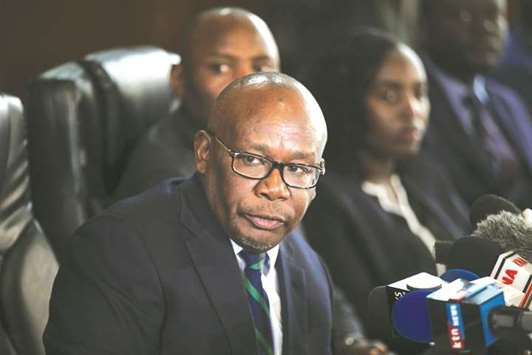Questions have mounted over the status of the government after the Supreme Court annulled Kenyatta’s victory in August’s presidential election due to widespread irregularities.
A planned re-run has already been delayed once – the vote is now set for October 26 – prompting fears of a constitutional crisis if the polls are not held within the 60-day limit, which expires on October 31.
“I wish to state categorically that there is no room for doubt as to what the constitution provides,” Attorney General Githu Muigai said at a press conference, called to clarify the law on the issue. “From the day a general election is declared to the day a new president or a re-elected president is sworn in, government continues without lacuna, without any void.”
Muigai said that Kenyatta would retain full executive authority but would not be permitted to make certain appointments or dismissals.
“Even in the very unlikely event that the election wasn’t held on the 60th day, that does not delegitimise the constitutional order,” said Muigai.
He said that there were various methods of expanding that constitutional time period under the guidance of the Supreme Court.
A leader from the National Super Alliance (NASA) coalition of opposition parties, Moses Wetangula slammed the attorney general as “mischievous and dishonest”.
He said Kenyatta was now merely a caretaker president, and if the constitutional period lapsed he will no longer be considered the president.
The Independent Electoral and Boundaries Commission (IEBC) faces a mammoth task in organising a fresh election in a little more than a month after being excoriated by the top court for bungling the August vote.
The opposition, which accused the commission of rigging the poll in favour of Kenyatta, has demanded that top officials be sacked and that providers of election materials and technology be changed.
The Supreme Court said that the IEBC had announced Kenyatta’s victory over opposition leader Raila Odinga without properly verifying the result, outlining a tallying process that had gone “opaquely awry”.
Kenyatta in turn accused the court of staging a judicial “coup”, saying that it had undermined democracy by arguing that “numbers don’t matter, it is processes that matter”.
As the country lingers in uncertainty over the upcoming election, both Kenyatta and his rival Raila Odinga have shown no sign of backing down from an increasingly toxic war of words.
“Uhuru has gone berserk. Like a cornered bloody-minded boxer, he is swaying on his feet, rocking the country and its institutions (with a) sudden flurry of desperate punches – with the judiciary as his prime target,” Odinga said yesterday.
He repeated his threat to boycott the new poll.
He said that while NASA remained prepared for a new election, it appeared increasingly likely their list of demands “will not be met and so there will be no elections”.
The botched election has plunged the country into its biggest political crisis since a disputed poll in 2007, which led to violence that left more than 1,100 people dead.

